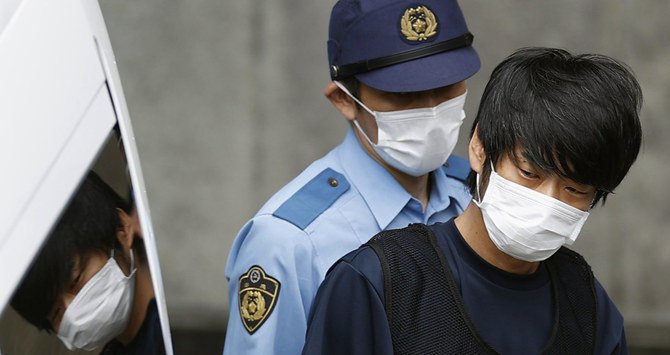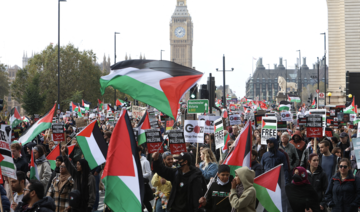TOKYO: The brazen assassination of former Japanese Prime Minister Shinzo Abe with a handmade gun shocked a nation unused to high-profile political violence.
But there has been another surprise in the weeks since the murder as details have emerged about an alleged assassin who was well-off until his mother’s huge donations to the controversial Unification Church left him poor, neglected and filled with rage.
Some Japanese have expressed understanding, even sympathy, for the 41-year-old suspect, especially those of a similar age who may feel pangs of recognition linked to their own suffering during three decades of economic malaise and social turmoil.
There have been suggestions on social media that care packages should be sent to suspect Tetsuya Yamagami’s detention center to cheer him up. And more than 7,000 people have signed a petition requesting prosecutorial leniency for
Yamagami, who told police that he killed Abe, one of Japan’s most powerful and divisive politicians, because of his ties to an unnamed religious group widely believed to be the Unification Church.
Experts say the case has also illuminated the plight of thousands of other children of church adherents who have faced abuse and neglect.
“If he hadn’t allegedly committed the crime, Mr. Yamagami would deserve much sympathy. There are many others who also suffer” because of their parents’ faith, said Kimiaki Nishida, a Rissho University psychology professor and expert in cult studies.
There also have been serious political implications for Japan’s governing party, which has kept cozy ties with the church despite controversies and a string of legal disputes.
Prime Minister Fumio Kishida’s popularity has plunged since the killing, and he has shuffled his Cabinet to purge members with ties to the religious group. On Thursday, the national police agency chief submitted his resignation to take responsibility over Abe’s assassination.
Yamagami, who is being detained for mental evaluation until late November, has previously expressed on social media a hatred for the Unification Church, which was founded in South Korea in 1954 and has, since the 1980s, faced accusations of devious recruitment practices and brainwashing of adherents into making huge donations.
In a letter seen by The Associated Press and tweets believed to be his, Yamagami said his family and life were destroyed by the church because of his mother’s huge donations. Police confirmed that a draft of Yamagami’s letter was found in a computer confiscated from his one-room apartment.
“After my mother joined the church (in the 1990s), my entire teenage years were gone, with some 100 million yen ($735,000) wasted,” he wrote in the typed letter, which he sent to a blogger in western Japan the day before he allegedly assassinated Abe during a campaign speech on July 8 in Nara, western Japan. “It’s not an exaggeration to say my experience during that time has kept distorting my entire life.”
Yamagami was 4 when his father, an executive of a company founded by the suspect’s grandfather, killed himself. After his mother joined the Unification Church, she began making big donations that bankrupted the family and shattered
Yamagami’s hope of going to college. His brother later committed suicide. After a three-year stint in the navy, Yamagami was most recently a factory worker.
Yamagami’s uncle, in media interviews, said Yamagami’s mother donated 60 million yen ($440,000) within months of joining the church. When her father died in the late 1990s, she sold company property worth 40 million yen ($293,000), bankrupting the family in 2002. The uncle said he had to stop giving money for food and school to the Yamagami children because the mother gave it to the church, not her children.
When Yamagami tried to kill himself in 2005, his mother did not return from a trip to South Korea, where the church was founded, his uncle said.
Yamagami’s mother reportedly told prosecutors that she was sorry for troubling the church over her son’s alleged crime. His uncle said she seemed devastated but remained a church follower. The authorities and the local bar association refused to comment. Repeated attempts to contact Yamagami, his mother, his uncle and their lawyers were unsuccessful.
Beginning in October 2019, Yamagami, who is widely reported to have tweeted under the name “Silent Hill 333,” wrote about the church, his painful past and political issues.
In December 2019, he tweeted that his grandfather blamed Yamagami’s mother for the family’s troubles and even tried to kill her. “What’s most hopeless is that my grandfather was right. But I wanted to believe my mother.”
Part of the reason Yamagami’s case has struck a chord is because he’s a member of what the Japanese media have called a “lost generation” that’s been stuck with low-paying contract jobs. He graduated from high school in 1999 during “the employment ice age” that followed the implosion of the country’s 1980s bubble economy.
Despite being the world’s third-largest economy, Japan has faced three decades of economic turmoil and social disparity, and many of those who grew up in these years are unmarried and are stuck with unstable jobs and feelings of isolation and unease.
Some high-profile crimes in recent years, such as mass killings in Tokyo’s Akihabara electronics district in 2008 and a fatal arson attack on Kyoto Animation in 2016, reportedly involved “lost generation” attackers with troubled family and work histories.
Yamagami’s case also has shed light on the children of Unification Church adherents. Many are neglected, experts say, and there’s been little help because government and school officials tend to resist interference on religious freedom grounds.
“If our society had paid more attention to the problems over the past few decades, (Yamagami’s) attack could have been prevented,” said Mafumi Usui, a Niigata Seiryo University social psychology professor and cult expert.
More than 55,000 people have joined a petition calling for legal protection for “second generation” followers who say they were forced to join the church.
Abe, in a September 2021 video message, praised the church’s work for peace on the Korean Peninsula and its focus on family values. His video appearance possibly motivated Yamagami, said Nishida, the psychology professor.
Yamagami reportedly told police he had planned to kill the church founder’s wife, Hak Ja Han Moon, who has led the church since Moon’s 2012 death, but switched targets because it was unlikely she’d visit Japan during the pandemic.
“Though I feel bitter, Abe is not my true enemy. He is only one of the Unification Church’s most influential sympathizers,” Yamagami wrote in his letter. “I’ve already lost the mental space to think about political meanings or the consequences Abe’s death will bring.”
The case has drawn attention to ties between the church, which came to Japan in 1964, and the governing Liberal Democratic Party that has almost uninterruptedly ruled post-World War II Japan.
A governing lawmaker, Shigeharu Aoyama, last month said a party faction leader told him how church votes could help candidates that lack organizational backing.
Tomihiro Tanaka, head of the church’s Japan branch, denied “political interference” with any particular party, but said the church has developed closer ties with governing party lawmakers than with others because of their shared anti-communist stance.
Members of the National Network of Lawyers Against Spiritual Sales, which for decades has provided legal assistance for people with financial disputes with the church, say they’ve received 34,000 complaints involving lost money exceeding a total of 120 billion yen ($900 million).
Tanaka accused the lawyers and the media of “persecuting” church followers.
A former adherent in her 40s said at a recent news conference that she and two sisters were forced to join the church when she was in high school after their mother became a follower.
After two failed marriages arranged by the church, she said she awoke from “mind-control” and returned to Japan in 2013.
As a second-generation victim “who had my life destroyed by the church, I can understand (Yamagami’s) pain, though what he did was wrong,” she said.
























